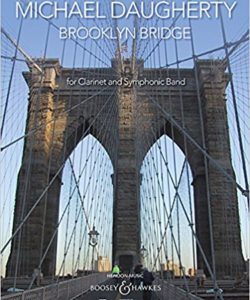Brooklyn Bridge
Equilibrium/January 2006
Michael Wayn, clarinet
University Of Michigan Symphony Band
Michael Haithcock, conductor

REVIEW FROM BARNES & NOBLE – ALL MUSIC GUIDE:
This CD by the University of Michigan Symphony Band combines two classics of the band repertory with creations by several of the stars of the university’s composition faculty; it’s of interest far beyond the Big Ten and shows something of the continuing vitality of the symphonic band tradition. The disc opens with a short, appropriately overture-like work by Bright Sheng, for “orchestra without strings.” Called “La’i,” it is loosely inspired by the mood of a type of Tibetan love song. Over nearly five minutes it moves from passages of dissonant, highly expressive evocation of the romantic feelings embodied in the Tibetan form to more transparent textures in which the basic pitch materials of the work are clarified; the effect is that of a feeling springing into clear definition.
Susan Botti’s “Cosmosis for wind ensemble, soprano, and women’s voices” sets diverse poetry by May Swenson; the texts do not fully hang together, but Botti’s dual treatment of the voices – at times they converse in a disorganized crowd, while elsewhere they sing sweetly – is compelling, and is integrated well into the textures of the band. Perhaps the disc’s highlight is the album’s title work, by Michael Daugherty, a fine example of his unique mixture of Stravinskian techniques with vernacular materials.
The four-movement work depicts views in four directions from the great New York bridge and at the beginning uses the clarinet and full band in a wonderful evocation of the bridge’s combination of delicacy and bulk. There seems to be less popular material here than in other Daugherty works, but he is just setting the listener up for the rollicking jazz of the Ivesian final movement, a piece of fun as infectious as anything in the recent concert repertoire. The University of Michigan Symphony Band under Michael Haithcock smoothly executes the pastoral textures of Percy Grainger’s “Lincolnshire Posy” and the final fantasia on “Chester” by William Schuman, and does not flag through a program of varied and fairly difficult music.
– James Manheim
